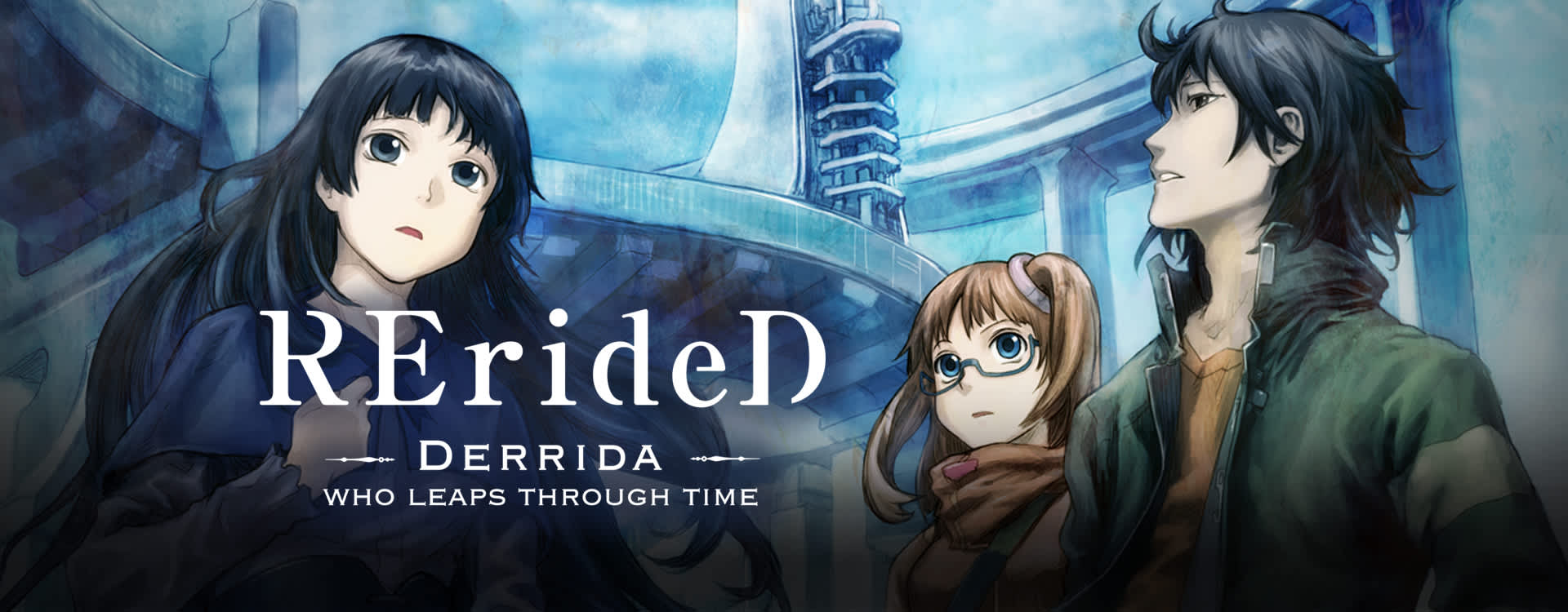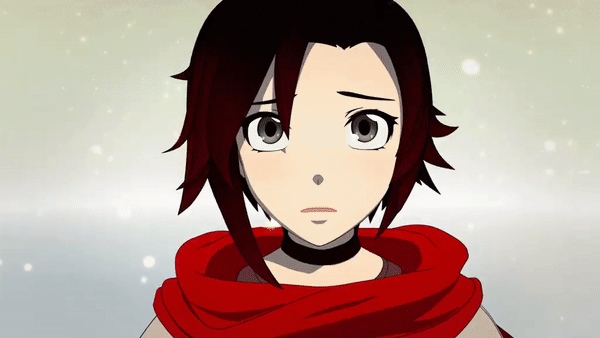English Dub Series Review: RErideD: Derrida, Who Leaps Through Time
And here I thought Doctor Who was hard to follow.
Overview (Spoilers Below!)
In the year 2050, Derrida Yvain is one of the lead developers of the DZs, a new model of robot super soldier. When Derrida and his partner Nathan notice a bug in the DZs’ programming, they’re quick to inform their boss Andrei, but he refuses to authorize a recall. That night, Derrida attends the eighth birthday party of Nathan’s daughter Mage, celebrating alongside her friend Yuri. Mage brings up Derrida’s college research into time travel, begging him to continue the project with Nathan. Derrida dismisses his old theories as a fantasy and gives her the DZ patch file. The next day, Andrei murders Nathan; Derrida hides inside a cryo chamber to escape his own assassination. When he emerges, ten years have passed.
In 2060, the world is a war-torn wasteland devastated by the DZs. Derrida discovers the hitman Videaux and his young daughter Mayuka, who offer to protect him in exchange for eventual payment. Returning to Nathan’s house, Derrida encounters a seventeen-year-old Yuri, who had been living with Mage until Mage left to pursue a mysterious goal. Wracked with guilt that he endangered her life, Derrida is determined to find Mage and protect her at any cost.
In Videaux’s artificially intelligent car, Derrida, Yuri, Videaux, and Mayuka travel throughout the ruins of their country, searching for answers. But Andrei isn’t happy that Derrida has returned, and he sends the deadly assassin Donna to finish him off. Derrida begins to have fits where the world swirls with white mist—and he’s visited by a Mage-like apparition named Ange—before allowing him to relive certain moments of his past. He realizes that he’s “time jumping” back to the day of the party, the day before everything went to hell. If Derrida can just manage to tweak the past during a time jump, maybe he can prevent this horrific war after all.
Our Take
It’s a shame this show is so confusing. If I could follow what was going on, it might even be good.
The premise of RErideD is clever and intriguing. It’s impossible to truly go back in time, because then there’d be two of you in the same place, causing all sorts of nasty paradoxes—but what if you could somehow project your current consciousness onto your past self? If you could re-experience, say, the events of 2009, armed with all the knowledge you possess in 2019? You’d have to have a near-perfect memory of past events to pull it off, which is where Derrida comes in—for Cryo Chamber Man, ten years ago really was just yesterday. He can only make the tiniest changes to the past, and he must exercise the utmost care—for once he relives a memory, Derrida can never revisit it again. This mechanism of time travel is highly original and fascinating to watch unfold.
Derrida’s world is an inspired mashup of past and present—Victorian clothes, record players, and pocket watches blend with robot housekeepers and AI cars (I love Graham). Hilariously, Andrei has a little robot whose sole purpose is to warn him when he’s about to spill his tea. The city is gleaming, futuristic, and well-animated. The show is excellent at creating ambiance—shots of dark, deserted streets prowled by DZs’ glowing red eyes are genuinely frightening. Although underdeveloped, Donna’s backstory is appropriately eerie and leaves me wanting more.
Maiko Iuchi’s soundtrack is immensely effective at evoking a sense of eerie nostalgia, especially Yuri’s song from the opening episode that makes a haunting return in the series finale. Lighting is used to evoke mood as well, especially in the museum, where the celestial globe casts a sphere of brilliant lights around our heroes and allows for poignant symbolism. Scenes are sometimes funny—when Yuri drives without her license, or when Videaux walks into a seedy bar and orders a glass of milk—and the frequent car chases are usually exciting.
But where RErideD truly excels is in its thoughtful exploration of complex, timely themes. We’re spared a cliché revenge plot or a forced, uncomfortable romance. Instead, the series tackles serious issues in satisfying and intelligent ways: war profiteering, nostalgia, government and corporate corruption, the question of what truly separates humans from robots. The show’s main theme is a debate about the ethics of scientific progress. RErideD asks us to consider, in a world where technological advances are almost guaranteed to be abused by those in power, is it our moral imperative to cease progress in order to keep tools of destruction out of evil hands? Or is it our duty as humans to pursue exploration and invention? Although Donna presents a compelling counterpoint, the show’s climax is a firm endorsement of progress. It is only by pursuing his dreams, by not giving up, by deciding to see his research through at any cost, that Derrida is able to save everything. As Mayuka says early on, humans are “not just happy being alive. We need to feel like we have some kind of purpose, too.”
Unfortunately, this show’s emotional intelligence makes it feel like it was written by DZs. I’m charmed by the wannabe writer Mayuka and the stereotype-defying Videaux (a tough, sensitive policeman-turned-assassin who abhors revenge, makes us laugh with his sassy quips, and tenderly cares for his young daughter), but nearly all other characters are flat and unmemorable. It says a lot that I cared more about the fate of the AI car than about any of the actual human characters. Derrida’s emotional reactions are phoned-in, furiously screaming all his lines with eye-rolling over-the-top intensity (this is both a fault of the subpar dialogue writing and of Adam Gibb’s lackluster performance). Chuck Hüber and Colleen Clinkenbeard are likable as Cassiel and Donna respectively, but the rest of the dub cast is simply mediocre. The writing is hokey and doesn’t further the characters’ development. Their animated movements are jerky (when they move at all), and their faces don’t betray much emotion either—fear and grief often become constipation.
Especially in early episodes, plot elements are unrealistic, exposition-fueled, and difficult to take seriously. Crucial concepts are underexplained—I’m still not quite sure why Derrida gave Mage the patch file. For no reason at all, Donna changes hair color from the first to second time she’s introduced, making me doubt if she was even the same person. At the start of one episode, we see a brief segment of Derrida and Videaux getting mug shots that are never brought back or followed up on. We also never get clarification on why the show stresses so heavily that Mage and Yuri are essentially the same people. Yuri spends a truly exhausting amount of time doubting Derrida’s identity, and Derrida’s sudden and intense need to murder Andrei makes him seem possessed rather than emotional.
Characters’ thought processes can be frustratingly nonsensical, such as when Derrida believes that Yuri must be holding a camera rather than a gun just because she liked taking pictures ten years ago, or when Derrida deduces that Nathan’s password is “happybirthday” because he last signed in on the day of Mage’s party. It’s unclear what, exactly, Derrida and Jacques’s relationship was, and Cassiel—one of the story’s most important figures—appears out of nowhere mid-series with no explanation, as if we should have known who he was all along. The war going on—a crucial piece of the show’s plot—is simply called “the war,” without any more elaboration of how or why it’s being fought.
Speaking of repetitive, RErideD clearly doesn’t trust its own ability to create a compelling antagonist, because it features a whopping four of them. Derrida must contend with the Donald Trump-like CEO Andrei, the annoyingly incompetent assassin Donna, some nameless guys trying to bomb them for who knows what reason, and the flamboyant government official Schmidt. Why does this show need all these different villains? The simple answer is that it doesn’t.
It’s impossible to overstate how confusing this show is, and how many key plot events just don’t make sense. And instead of spending time on the fascinating themes, most of the airtime is just spent on shoot-em-ups with no stakes. The supposedly deadly DZs and Donna never hurt anyone, and Derrida—a nerdy scientist who has presumably never shot a gun before—always hits his target.
Episode twelve is a shockingly large improvement on what comes before it—the climax is heartfelt and satisfying, expanding on the main themes and answering most of my important questions. But after five and half hours of bafflingly incoherent writing, this stellar finale may be too little too late.
If I were to time ride back to the first moment I watched this show, I would recall confusion, frustration, and occasional delight. If you have the patience to sit through all twelve episodes, the ending is certainly rewarding. But, as the past Derrida left behind, RErideD could use a whole lot of editing.
























"There are also other characters that come and go (also owned by the Warner Bros. Discovery conglomerate media company)."
Huh. Is that just referring to other characters from the show itself, or is this implying that the new season is going to have cameos from other WBD IPs